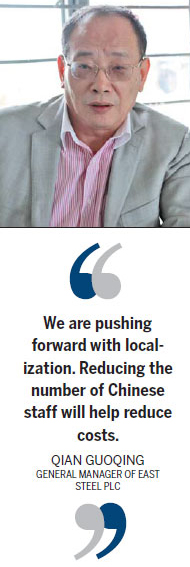 |
|
A view of the East Steel factory in Dukem, Addis Ababa, during the rainy season in August when production was halted. [Provided to China Daily] |
Work ethics in country of the 'high happiness index' does not weaken firm's resolve to succeed
Just as the one-eyed man is king in the kingdom of the blind, East Steel is a master of all it surveys in Ethiopia's steel industry. That is despite its minuscule output of 300,000 tons, which, if it were in China, would long since have put it out of business.
The company's reinforcing bars, known as rebar, are mainly for the local market, where about 70 percent of the products are imported.

East Steel invested 160 million yuan ($25.8 million) in its rebar production line that started operating in November last year. But its general manager, Qian Guoqing, says investors have decided to pour another 50 million yuan into a production line for wire rods and angle bars. The aim is for the second line to manufacture 100,000 tons annually when production begins next year.
Most angle bars used in Ethiopia are imported, but for China, where overcapacity has been a huge problem in the steel industry, things could not be any more different.
China is by far the world's largest steel producer, producing 779 million metric tons last year; the No 2 ranked European Union produced a mere 165 million metric tons, the World Steel Association says.
A number of foreign companies, such as from India and Saudi Arabia, have agreed to invest in Ethiopia's crude-steel industry, which has been given high priority under the government's five-year Growth and Transformation Plan.
Qian says that despite the shortage of locally produced steel products, competition is fierce for his company.
The quality of the imports is good, he says, but East Steel produces world-standard products, he says. The company has submitted a bid for 57,000 tons of rebar, used mostly in Ethiopian government urban construction projects.
East Steel is in the Eastern Industry Zone about 37 km from downtown Addis Ababa, and now has 500 employees, about 50 of them from China.
The Chinese workers are mostly technical workers who still cannot be replaced by local workers. Qian says local employees are now being trained but this will take time. "We are pushing forward with localization. Reducing the number of Chinese staff will help reduce costs."
For the Eastern Industry Zone, home to about 20 Chinese-invested companies, East Steel has been a major electricity user, although by Chinese standards it uses little electricity. This means that before a new substation goes into operation in the industrial zone, East Steel has to operate night shifts to avoid daytime peak electricity use.
Local employees, mostly from two nearby towns, have no problem with working night shifts, Qian says.
